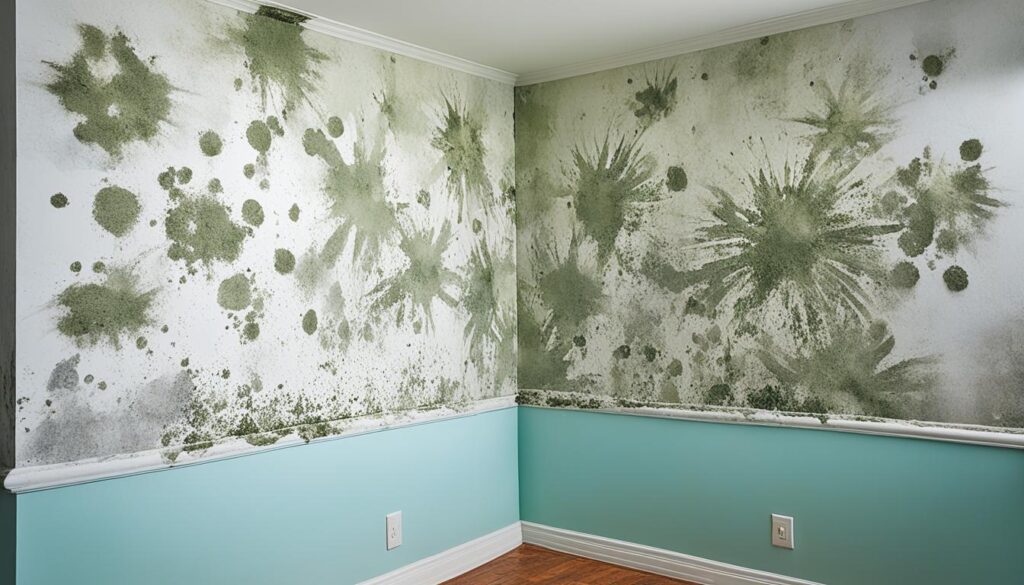
Miami Mold Symptoms: Health Effects & Awareness
Welcome to our informative article on the symptoms of mold in Miami and its impact on health risks and indoor air quality. Mold is a common issue in humid climates like Miami, and it can have serious consequences for both physical health and the overall well-being of residents. By understanding the symptoms of mold exposure and the associated health risks, you can take proactive steps to protect yourself and your loved ones.
Key Takeaways:
- Mold exposure in Miami can lead to various health issues.
- Identifying symptoms of mold is essential for timely intervention.
- Poor indoor air quality can worsen the effects of mold exposure.
- Respiratory problems, allergies, and asthma are common symptoms of mold exposure.
- Prompt action and professional assistance are crucial for mold prevention and remediation.
Identifying Symptoms of Mold in Miami Homes
When it comes to protecting your health and maintaining a safe living environment, identifying the symptoms of mold in Miami homes is crucial. Mold can often go unnoticed, but its presence can lead to various health issues. By recognizing the signs and indicators, you can take appropriate action to address the problem promptly and effectively.
Mold symptoms can manifest in different ways and vary from person to person. Common signs of mold include:
- Respiratory issues: If you experience persistent coughing, wheezing, or difficulty breathing, it could be a result of mold exposure.
- Allergies: Mold spores can trigger allergic reactions, such as sneezing, runny nose, itchy eyes, and skin rashes.
- Unexplained fatigue: Mold exposure can leave you feeling constantly tired and lacking energy.
- Headaches: Recurring headaches, migraines, or sinus pressure may be linked to the presence of mold.
- Exacerbation of existing conditions: Individuals with respiratory conditions like asthma or allergies may experience worsening symptoms in the presence of mold.
It’s important to note that these symptoms can also result from other causes, so it’s crucial to consider the possibility of mold when experiencing any of these signs. If you suspect mold in your Miami home, it’s advisable to seek professional assistance for proper detection and remediation.
Remember, early detection is key when it comes to tackling mold issues. By promptly addressing the symptoms and signs of mold, you can safeguard your health and prevent further damage to your home.
To provide you with a visual guide, here is a breakdown of the common symptoms of mold in Miami homes:
| Symptom | Description |
|---|---|
| Respiratory issues | Persistent coughing, wheezing, difficulty breathing |
| Allergies | Sneezing, runny nose, itchy eyes, skin rashes |
| Unexplained fatigue | Constant tiredness, lack of energy |
| Headaches | Recurring headaches, migraines, sinus pressure |
| Exacerbation of existing conditions | Worsening of respiratory conditions like asthma or allergies |

Health Risks of Mold Exposure in Miami
Exposure to mold in Miami can pose significant health risks. Mold spores present in the air can trigger various respiratory problems, allergies, asthma attacks, and other health issues. It is essential to understand the potential dangers and take necessary measures to prevent mold-related health problems.
Mold exposure can lead to respiratory issues such as coughing, wheezing, and shortness of breath. Individuals with pre-existing respiratory conditions like asthma or chronic obstructive pulmonary disease (COPD) may experience exacerbated symptoms or more frequent attacks.
Allergies are another common health problem associated with mold exposure. Exposure to mold spores can cause allergic rhinitis, characterized by symptoms such as sneezing, runny nose, itchy eyes, and congestion. Individuals with mold allergies may also experience skin reactions or develop allergic asthma.
In some cases, mold exposure can even lead to more severe health complications. Long-term exposure to high levels of mold spores can weaken the immune system, making individuals more susceptible to infections and illness. Additionally, certain types of mold, such as black mold (Stachybotrys chartarum), release toxins known as mycotoxins, which can further exacerbate health problems.
“Mold growth in indoor environments should not be ignored. It poses a serious health risk, especially for individuals with respiratory conditions. It is crucial to take prompt action to remediate and prevent mold growth to protect yourself and your family.”
Improving indoor air quality is a key factor in minimizing the health risks of mold exposure. Regularly inspecting and addressing moisture issues, ensuring proper ventilation in damp areas, and maintaining adequate humidity levels can help prevent mold growth. It is also important to promptly address water leaks, humidity problems, or any signs of mold growth to prevent further health risks.
The Effects of Mold Exposure on Children and the Elderly
Children and the elderly are particularly vulnerable to the health risks associated with mold exposure. Their immune systems may be weaker, making them more susceptible to respiratory problems and infections caused by mold. Additionally, prolonged exposure to mold can have a greater impact on their overall health and well-being.
For children, mold exposure can lead to persistent respiratory symptoms, increased susceptibility to respiratory infections, and potential developmental issues. It is crucial to create a safe and mold-free environment for children to promote their healthy growth and development.
Similarly, the elderly may experience more severe health complications due to mold exposure. Chronic respiratory conditions, weakened immune systems, and other age-related factors can make them more susceptible to the adverse effects of mold. Protecting the health of the elderly by maintaining good indoor air quality is essential in ensuring their overall well-being.
| Health Risks of Mold Exposure in Miami | Prevention Measures |
|---|---|
| Respiratory problems | Regularly inspect and address moisture issues |
| Allergies | Ensure proper ventilation in damp areas |
| Asthma attacks | Maintain adequate humidity levels |
| Weakened immune system | Promptly address water leaks and signs of mold growth |
| Mycotoxin exposure | Implement remediation and prevention measures |
By taking proactive steps to prevent and address mold growth, individuals can minimize the health risks associated with mold exposure in Miami. It is crucial to maintain a healthy indoor environment and prioritize the well-being of yourself and your loved ones.

Conclusion
Being aware of the symptoms of mold and the health risks associated with its exposure is of utmost importance for residents of Miami. Promptly identifying mold symptoms and taking appropriate measures to address the issue can significantly impact indoor air quality and safeguard personal health. Mold exposure can lead to respiratory problems, allergies, asthma attacks, and other health concerns. Therefore, it is crucial to maintain good indoor air quality and prevent mold growth.
If you suspect mold in your Miami home, seeking professional help is recommended. Fix Mold Miami offers professional mold assessments, prevention, and remediation services. Their team of experts can identify the presence of mold, assess its severity, and propose efficient solutions to eradicate and prevent future mold growth. Protect your health and ensure a healthier living environment by contacting Fix Mold Miami at 305-465-6653 for professional mold services.
Remember, taking proactive measures against mold and maintaining a clean, mold-free environment is key to a healthier and safer living space in Miami.




